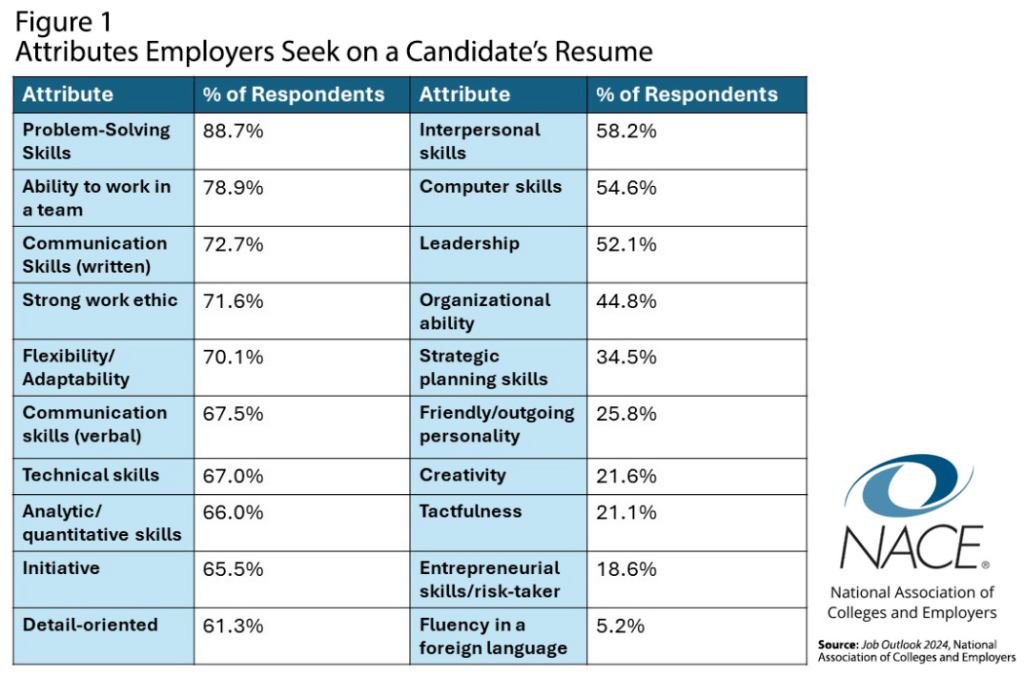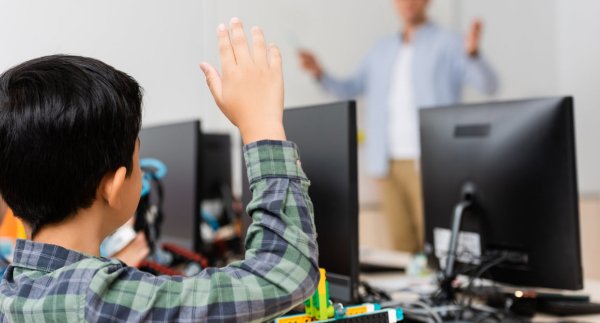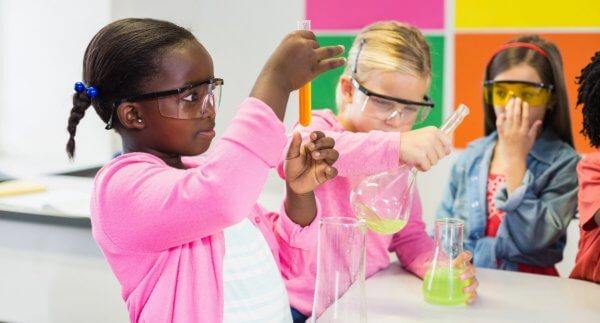When I ask my students what they want to do when they grow up, most of them don’t want to be developers. Even though they’re learning to code, they have many varied interests. There are the YouTubers, gamers, biologists, teachers, etc.
I tell them that coding is a skill that translates across all of these industries and careers. It’s become a core skill for kids growing up in the AI generation. But it doesn’t only apply to becoming a developer or working with websites. It opens up possibilities for kids and teens in many industries and career types.
Besides coding skills, when kids learn to code they are learning soft skills that translate to non-technical careers as well.
Let’s take a look at some of the skills kids develop when they’re coding that will help in non-tech careers.
What are employers looking for?
First, we should understand what is important to employers.
There are skills that every employer looks for and it’s not always a strong GPA or tons of experience. With online applications, employers have to look through hundreds of resumes. All of these applicants meet the minimum requirements for the job. So, what makes them choose one candidate over another?
According to NACE’s (National Association of Colleges and Employers) Job Outlook 2024 report, these are the top attributes employers seek on a candidate’s resume:

“90% of employers responding to the Job Outlook 2024 survey indicated they are seeking evidence of a student’s ability to solve problems”
Notably, when asked what attributes they are looking for on the resumes of the job candidates they consider for their job openings, nearly 90% of employers responding indicated they are seeking evidence of a student’s ability to solve problems and nearly 80% are seeking candidates who have strong teamwork skills.
These skills have nothing to do with the technical requirements of the job. Employers want someone who can go above just the to-do list and work well within a team.
The top 5 attributes employers seek are:
- Problem-solving skills
- Ability to work on a team
- Communication skills (written)
- Strong work ethic
- Flexibility/adaptability
Coding teaches all of these skills in different ways.
Skills that kids learn in coding
All of these skills are naturally developed while kids learn to code. If your child learns to code, even if they don’t choose a career that requires coding, they will be prepared.
Problem-solving skills

Just like this is the top skill employers are looking for, it’s also the top skill kids learn from coding. Every step of coding involves solving problems and coming up with the correct solution. Sometimes there’s just one right answer, but often there are many ways to solve a coding problem.
Let’s say kids want to create a button that triggers a pop-up. We ask them to break the creation of the button down into multiple steps. They deconstruct the big problem, the development of the button, into smaller problems like the front-end visual of the button and then the back-end code.
Debugging is another aspect of coding that requires problem-solving. If the button isn’t working the first time, we ask students to review each step of their code to identify the problem and come up with a solution. Programmers will test the button, edit their code, and test again. This iterative process teaches kids how to think critically about their solution and why it’s not working.
By practicing consistently, kids develop a problem-solving framework that guides them to a solution every time. This framework can be applied not just to coding, but to any problems they have.
Ability to work on a team

Most development projects are done by a team of developers, sometimes even hundreds. Each of these developers may have specialized skills or a specific part of the development process.
Working on a team means learning how to interact with people who have different personalities and backgrounds. The more exposure they have to new opinions and ways of working, the more prepared they’ll be for the workforce.
In our group classes, kids learn about teamwork by working together towards a common goal. As a team, kids experience sharing their successes and working through roadblocks together. When one person has a bug in their homework, we review the code as a class and come up with solutions. This improves the ability of all students.
This experience will help kids in any job. At a new job or with clients, you never know what kind of personalities you will be interacting with. They’ll have the ability to handle those interactions and deal with all different types of people.
Communication skills (written)

Essentially, what programmers do is communicate with a computer through a coding language. When kids learn to code, they are learning to communicate in a new written language. It requires them to write clear code and documentation for others to understand. Coding also requires that kids be detail-oriented and attentive. Even a small mistake can break a program.
Besides the code, developers write comments for those reading their code, mostly other developers. This requires clear communication of what each piece of code does. They may also leave notes about bugs and fixes.
Kids’ typing skills also improve when they’re coding. They will get better at typing faster and type more accurately. Faster typing skills make them a more effective communicator and worker.
Almost every job relies on good written communication skills, even if they’re offline. Having good communication skills translates to writing emails, reports, and more. It makes you a valuable team member.
Strong work ethic

A strong work ethic is a demonstrated commitment to your job and doing your best work. Coding develops a strong work ethic in kids because they have to be resilient and persistent to understand difficult concepts and problems and stick with the learning process.
Developers often work hours or even days just to fix one small bug in their code. This requires them to continue trying in the face of failure. Kids who have been coding consistently over a long period of time show their commitment to learning and growing. They are able to persevere when there are difficult problems.
In the workplace, they may experience these types of problems also. Instead of giving up, kids who have done coding will continue to try.
Flexibility/adaptability

While coding may seem rigid, it actually requires a lot of adaptability. It encourages kids to approach problems from multiple angles, embrace change, and adjust to unforeseen challenges.
For example, developers may have a plan for how to build an app. Oftentimes, the code isn’t working the way they expected This requires a different solution or approach to complete the task or project. They have to pivot and come up with a new plan. This could cause a lot of stress and frustration, but kids who code have experience handling this situation. They are more flexible to change and coming up with creative solutions.
Debugging is an important part of what we teach kids too. This shows them that setbacks are temporary and part of the process. They have to adjust to unforeseen circumstances and fix them before they can move on. This fosters a flexible and adaptable mindset.
In other jobs, being able to adapt quickly is always beneficial. There are many fast-paced industries that benefit from this.
There are many other skills that kids will gain from learning how to code. See these 26 reasons learning to code benefits your child.
Non-tech careers that also use coding
Kids can also apply their coding skills to other non-tech careers. More and more, the use of code is being used to enhance the productivity and output of other industries.
Entrepreneurs
Building a successful business requires many different skills, but knowing how to write programs gives kids a competitive edge in creating their own products.
Having coding skills has allowed many founders, like Mark Zuckerberg and Elon Musk, to start their businesses. Without these skills, they would have had to rely on a development team. Instead, they were able to do it themselves and innovate new ideas.
As an entrepreneur, knowing how to code also gives them the knowledge to better communicate with the development team. They’re able to bridge the gap between the business and technical sides of their company.
Musicians
Coding has been used in music for a variety of purposes, including music programming, cryptography, and identifying recordings. Music programmers produce music using electronic devices and computer software. A music software engineer is a professional who designs, develops, and maintains software applications used in the music industry. They work with musicians, producers, and sound engineers to create and enhance software that is used to create and produce music.
Much of the music you hear from your favorite artists is computer-generated. But coding skills take this power to a much higher level. Developers have also created AI that produces new music from just a simple text prompt.
Scientists
Scientists often deal with storing and accessing large datasets, the perfect thing for a computer to do. Programming skills can make data collection and analysis efficient and effective. Machine learning algorithms help identify patterns in complex data, such as genomics or climate studies. Coding then enables the creation of graphs, charts, and interactive visualizations to better interpret data and communicate results.
They also create models to predict possible outcomes and solve complex problems. Scientists use coding to simulate phenomena like weather patterns, molecular interactions, or ecological systems. Simulations allow for testing theoretical models before conducting costly or time-intensive experiments.
Coding is also used to program robots, drones, and autonomous vehicles for fieldwork, like underwater exploration or planetary rovers. By leveraging coding, scientists gain the tools to tackle complex problems, enhance efficiency, and make discoveries that would be impossible with manual methods alone.
See more unexpected careers that involve coding.
Explore Coding for Kids
The skills learned in coding are important no matter what kids decide to do. Writing code may only be a small part of their lives. But the soft skills they learn will last them a lifetime.
In our coding classes, we teach kids not just how to code but prepare them with the skills they need for college and career. Students learn live with an expert instructor and build projects in every class. When they complete the program, they also leave with a portfolio of unique projects so they have a proven track record of success.
Enroll in our top-rated coding classes to develop these skills and more!
